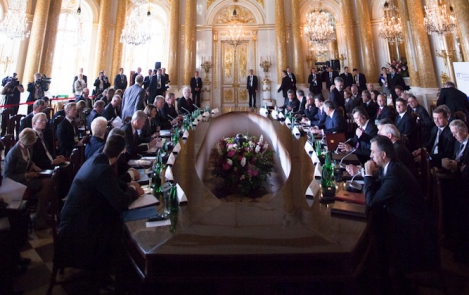-
Reset
+


President Ilves at the meeting of Central European government leaders: each revolution does not necessary result in democracy
27.05.2011
Central European government leaders together with the President of the Republic of Estonia, Toomas Hendrik Ilves, are determining solutions in Warsaw today to the question of how the Central-Europe and pan-Atlantic community can help people living near Europe in creating a stable and democratic political system based on the experience of Europe in the last 20 years.
“Changing policy alone is not enough to win a victory over authoritarian or totalitarian regimes and achieve democracy. We have seen this right here in Europe and in neighbouring areas in the last two decades since the fall of the Soviet Union”, said President Ilves. “The result of those revolutions was often not democracy.”
The President used the example of the authoritarian regime in Belarus, which has forced as democratic countries to implement political and economic sanctions.
“Both for us and for a lot of others there was a window of opportunity, which the Baltic countries, for example, were able to use to their advantage and I am sad that many other countries were not able to use it as for them this window is now closing, and reopening it would be complicated,” said president Ilves.
According to the Estonian Head of State, a task that is more complicated than changing a regime is building up the democratic foundation that involves a lot of effort and will, as the latter symbolises rule of law, a civil society, market economy, controlling corruption and economic success.
“If we observe the protest against the stagnated and authoritarian regimes in North Africa and Middle East and remember our own and our neighbours’ contemporary history, the successful post-communist countries should feel obliged to help to build up these countries if asked,” said President Ilves. “We remember our dreams, and we have the experiences and the knowledge in how to turn these dreams into reality. We also have an understanding: every country that has not achieved democracy after deposing the repressive order is unsuccessful. However, in Europe and in the neighbouring areas we wish to see successful countries.”
In speaking about Europe, the Estonian Head of State encouraged people to abandon the so-called mental geography, which divides countries into the East and the West, into old and new.
“That type of a division is no longer valid,” confirmed President Ilves to the government leaders of the Central European countries.
“There are the countries with responsible budget policies who dutifully follow the rules that we – for example in the European Union – agreed on and those countries whose governments are borrowing their wealth and are on the verge of bankruptcy.”
Poland, who despite the crisis managed to retain the economic growth through intelligent and responsible actions, is one of the examples of how the former mental geography in Europe can be misleading, emphasised President Ilves.
“Some European politicians and governments said that Poland is a country that only produces plumbers but now it has become a positive example to these same governments of how a country, which was only freed from the totalitarian rule 20 years ago, is successful and influential not only in the areas nearby but in a broader sense,” said the Estonian Head of State.
The Polish Vice President, Bronislaw Komorowski, has invited the presidents of Bulgaria, the Czech Republic, Montenegro, Slovakia, Austria, Italy, Estonia, Albania, Latvia, Slovenia, Macedonia, Lithuania, Croatia, Ukraine, Germany, Hungary, Bosnia and Herzegovina, Moldova and Kosovo to attend the meeting of the Central European government leaders in Warsaw. Later this evening, the President of the United States Barack Obama will also join them.
Office of the President
Public Relations Department
Phone +372 631 6229




